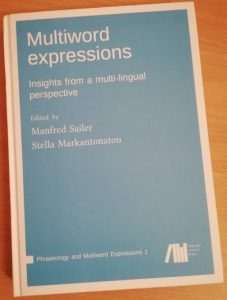Earlier this week, Language Science Press has published the following edited volume:

Sailer, Manfred & Stella Markanotantou. 2018. Multiword expressions: Insights from a multi-lingual perspective (Phraseology and Multiword Expressions, Vol 1). Berlin: Language Science Press. doi 10.5281/zenodo.1182583
The book is one of the results of the COST Action 1207 Parseme: Parsing and Multiword Expressions (2013-2017).
The book is summarized on the web page as follows:
“Multiword expressions (MWEs) are a challenge for both the natural language applications and the linguistic theory because they often defy the application of the machinery developed for free combinations where the default is that the meaning of an utterance can be predicted from its structure. There is a rich body of primarily descriptive work on MWEs for many European languages but comparative work is little. The volume brings together MWE experts to explore the benefits of a multilingual perspective on MWEs. The ten contributions in this volume look at MWEs in Bulgarian, English, French, German, Maori, Modern Greek, Romanian, Serbian, and Spanish. They discuss prominent issues in MWE research such as classification of MWEs, their formal grammatical modeling, and the description of individual MWE types from the point of view of different theoretical frameworks, such as Dependency Grammar, Generative Grammar, Head-driven Phrase Structure Grammar, Lexical Functional Grammar, Lexicon Grammar.“
(Click here for a more detailed presentation)
The volume contains a paper by Sascha Bargmann & Manfred Sailer on The syntactic flexibility of semantically non-decomposable idioms. In this chapter, Sascha and Manfred motivate a lexical analysis even for semantically non-decomposable idioms such as kick the bucket `die’ and its German equivalent den Löffel abgeben `die’ (lit.: `pass on the spoon’). They derive the restricted syntactic flexibility from the semantics associated with the individual words constituting the idiom and from general constraint on the relevant syntactic constructions, in particular passive and fronting.
The book is at the same time the first volume of the series Phraseology and Multiword Expressions. There are currently three more volumes in preparation for this series.
